新概念一册第121课件
合集下载
新概念英语第一册 Lesson121-122 (共28张PPT)

Yes, she is wearing a red blouse ___w_h_ic_h__suits her so much.
营业员和顾客 _s_h_o_p_a_s_si_s_ta_n_t_a_n_d_c_u_s_to_m__er___ regular customer __经_常__光_顾__的__客_人______
Vocabulary
(2). forget v. 忘记 (forget - _f_o_r_g_ot__ - _f_o_r_go_t_t_e_n_) 结构:forget to do sth. _忘__记_去__做__某_事__(还__没__做_)__
forget doing sth. _忘__记_做__过__某_事__(做__过_了__)__
e.g. I have forgotten _t_o_b_r_in_g__ my book.(bring) I will never forget __fi_n_d_in_g_ that rare coin in
你能开一下窗吗?
Sentences
put on 穿上,文中的it指代 ___衣_服__. 辨析:wear_穿_着__(_强_调__状_态__) V .S. put on _穿_上__(强__调__动_作__)
试一试:选词填空: I like to __w_e_a_r_ the hat every day. Please __pu_t_o_n_ your shoes. It is so untidy here.
定语从句练习:教材 P248 句型练习,注意连接词的运用
试一试 3: Neil and Yoyo are walking on the playground. They see many interesting people and things there.
营业员和顾客 _s_h_o_p_a_s_si_s_ta_n_t_a_n_d_c_u_s_to_m__er___ regular customer __经_常__光_顾__的__客_人______
Vocabulary
(2). forget v. 忘记 (forget - _f_o_r_g_ot__ - _f_o_r_go_t_t_e_n_) 结构:forget to do sth. _忘__记_去__做__某_事__(还__没__做_)__
forget doing sth. _忘__记_做__过__某_事__(做__过_了__)__
e.g. I have forgotten _t_o_b_r_in_g__ my book.(bring) I will never forget __fi_n_d_in_g_ that rare coin in
你能开一下窗吗?
Sentences
put on 穿上,文中的it指代 ___衣_服__. 辨析:wear_穿_着__(_强_调__状_态__) V .S. put on _穿_上__(强__调__动_作__)
试一试:选词填空: I like to __w_e_a_r_ the hat every day. Please __pu_t_o_n_ your shoes. It is so untidy here.
定语从句练习:教材 P248 句型练习,注意连接词的运用
试一试 3: Neil and Yoyo are walking on the playground. They see many interesting people and things there.
新概念英语第一册121-122课课件

• • • Байду номын сангаас • • • • •
I can’t remember. The man who I served was wearing a hat. wear 穿(表示状态) put on 穿上(强调动作) Have you got a hat, sir? Yes, I have. Would you put it on, please? All right. Would you…? 请你…好吗?
manager n. 经理 销售经理 sales manager 总经理 General Manager 他是我们的经理 He is our manager. manage v. 管理 经营公司 manage a company
• • • • • • • • • • •
serve v. 照应,服务,接待 一位年轻的侍者侍候他们进餐 A young waiter served them. serve sb right (口语) 给某人应得的报应(惩罚) 他活该 Serve him right.= It serves him right! service n. 那家餐馆的服务很差。 The service in that restaurant is poor. a charge for service 服务费
• Is this the man that you served. Caroline? • Yes, I recognize him now.
• • • • •
counter n. 柜台 在珠宝部 at the jewelry counter 付帐柜台 checkout counter
• • • • • • •
recognize v. 1) 认出 你能认出他的笔迹吗? Do you recognize his handwriting? 2)承认(事实),认清,确认 我们都肯定她在舞蹈方面有才华。 We all recognized her talent for dancing. • 他不承认自己犯下了大错。 • He didn’t recognize that he had made a big mistake.
新概念一Lesson 121 (共22张PPT)-精品课件
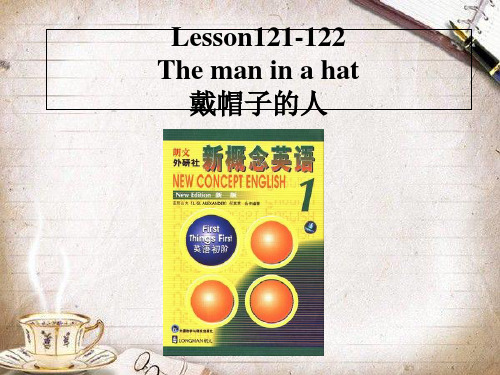
A 1.The book___ I bought yesterday is lost.
A. that B. whose C. who D. whom
D 2. The river ___ is in front of my village is quite clean.
A. who B. what
C. /
口诀:
被修饰词是人, 从句缺主只用Who, 从句缺宾Who,Whom. 被修饰词是物, 要用Which来帮助, that是万金油.
用who whom which填空
1. Do you know the man who is smoking? 2. The building which is the tallest in our
server /'sə:və/ n.服务员 service /'sə:vɪs/ n.服务
counter /'kaʊntə/ n.柜台 count /kaʊnt/ . 数
recognize /'rekəɡnaɪz/ v.认出 know /nəʊ/ v.认识
road /rəʊd/ n.路(通车的大道 ) 谚语: All roads lead to Rome. 条条大道通罗马。 street /stri:t/ n.指城市中的街道或马路 way /weɪ/ n. 可表示各种各样的道路 也可指方法。
MANAGER: Have you got a hat, sir? CUSTOMER: Yes, I have. MANAGER: Would you put it on,
please? CUSTOMER: All right. MANAGER: Is this the man that you
新概念第一册121课件

Grammar
定语从句(The Attributive Clause)
as, that 必须以that引导的定语从句的用法
1) 当先行词是 anything, everything等不定代词时 Is there anything in this book that is worth reading?
serve sb right (口语)给某人应得的报应 (惩罚)
e.g. Serve him right. = It serves him right!
(他活该)罪有应得!
serve
v.
照应,
服务,接待
seve
service
n.
e.g.The service in that restaueant is poor. 那家餐馆的服务很差。
即可指人也可指物,在从句中做定语。 Miss Li is the teacher whose house caught fire last year
This is the boy whose mother is our Chinese teacher.
The house whose roof is damaged has now been repaired.
e.g. He forgot his unbrella on the train. 他将伞遗忘在火车上。
e.g. he left his umbrella on the train.
manager
n. 经理
a sales manager 销售经理
manager manage a firm
v. 管理 经营公司
That was the reason why she had changed that much.
新概念英语第一册第L121幻灯片课件

I felt very excited.
Lesson 121
Revision: Lesson119 A true story
❖ story
n.
❖ happen
v.
❖ thief
n.
❖ enter
v.
❖ dark
adj.Hale Waihona Puke ❖ torchn.
❖ voice
n.
❖ parrot
n.
❖ exercise book n.
( )10. --- Jimmy is leaving for a holiday. --- Really? Where _______ he _______? A. has; gone B. will; go C. did; go D. would; go
( )11. Frank _______ to see his grandma if he _______ free tomorrow.
( )2. --- How was your weekend on the farm?
--- Great! We _______ with the farmers.
A. enjoy ourselves B. went fishing
C. will work
D. make friends
( )3. --- What did Mr Jones do before he moved here? --- He _______ a city bus for over twenty-five years. A. is driving B. drove C. had driven D. drives
A. will come; will be B. comes; is
Lesson 121
Revision: Lesson119 A true story
❖ story
n.
❖ happen
v.
❖ thief
n.
❖ enter
v.
❖ dark
adj.Hale Waihona Puke ❖ torchn.
❖ voice
n.
❖ parrot
n.
❖ exercise book n.
( )10. --- Jimmy is leaving for a holiday. --- Really? Where _______ he _______? A. has; gone B. will; go C. did; go D. would; go
( )11. Frank _______ to see his grandma if he _______ free tomorrow.
( )2. --- How was your weekend on the farm?
--- Great! We _______ with the farmers.
A. enjoy ourselves B. went fishing
C. will work
D. make friends
( )3. --- What did Mr Jones do before he moved here? --- He _______ a city bus for over twenty-five years. A. is driving B. drove C. had driven D. drives
A. will come; will be B. comes; is
新概念英语第一册第121-122课课件
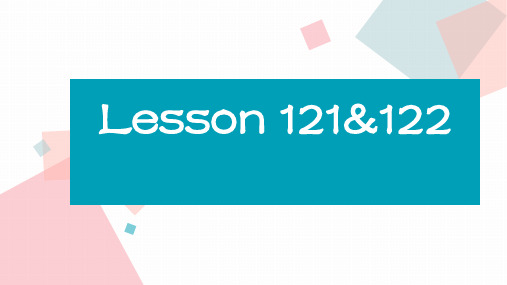
wear v.
戴牙套 wear a brace on her teeth 戴眼镜 wear a pair of glasses 戴帽子 wear a hat
forget to do something 忘记要做某事
take sth. with sb.
把某物随身带着/拿着
serve sb.
接待某人
I eat my breakfast at…
hurry up 赶快 be late (for…) (…)迟到
Don’t be late for school again! 上学别再迟到了。
Don’t be late for work again! 上班别再迟到了。
Is Lily late for school? Yes, she is。
Lesson 121&122
Review
It’s twelve o’clock.
It’s half past six.
It’s eleven o’clock.
It’s half past one.
get up 起床
What time does Lily get up? She gets up _a_t__se__v_e_n__o_’_c_l_o_c_k. Q: What time do you get up every day?
Which books did you buy?
The books which are on the counter.
Manager: Did you serve this gentleman half an hour ago, Caroline? He says he’s the man.
Caroline: I can’t remember. The man was wearing a hat. Manager: Have you got a hat, sir? Customer: Yes, I have. Manager: Would you put it on, please? Customer: All right. Manager: Is this the man, Caroline? Caroline: Yes. I recognize him now.
Lesson121(课件)新概念英语第一册

Exercises before class:把下列句子合并成一个句子。
• 1. This is the girl. The girl served me.
• 2. This is the book. I bought the book.
Exercises before class:把下列句子合并成一个句子。
• 6. 带着一顶帽子
• 7. put it on
• 7. 把它带上
• 8. all right
• 8. 好吧
• 9. recognize him
• 9. 认出他
Phrases:
• 1. The lady who is standing behind the counter. • 2. The books which are on the counter. • 3. He says that he's the man who bought these books. • 4. The man who I served was wearing a hat. • 5. Is this the man that you served?
• 2. half an hour ago
• 2. 半个小时以前
• 3. forget to do
• 3. 忘记做பைடு நூலகம்事
• 4. take sth. with sb.
• 4. 某人随身携带
• 5. stand behind the counter • 5. 站在柜台的后面
• 6. wear a hat
but I f_o_r_g_o(tftoorgtaekt)ettohteamkewtihthemme. with me.
• 1. This is the girl. The girl served me.
• 2. This is the book. I bought the book.
Exercises before class:把下列句子合并成一个句子。
• 6. 带着一顶帽子
• 7. put it on
• 7. 把它带上
• 8. all right
• 8. 好吧
• 9. recognize him
• 9. 认出他
Phrases:
• 1. The lady who is standing behind the counter. • 2. The books which are on the counter. • 3. He says that he's the man who bought these books. • 4. The man who I served was wearing a hat. • 5. Is this the man that you served?
• 2. half an hour ago
• 2. 半个小时以前
• 3. forget to do
• 3. 忘记做பைடு நூலகம்事
• 4. take sth. with sb.
• 4. 某人随身携带
• 5. stand behind the counter • 5. 站在柜台的后面
• 6. wear a hat
but I f_o_r_g_o(tftoorgtaekt)ettohteamkewtihthemme. with me.
最新新概念一册第121课件
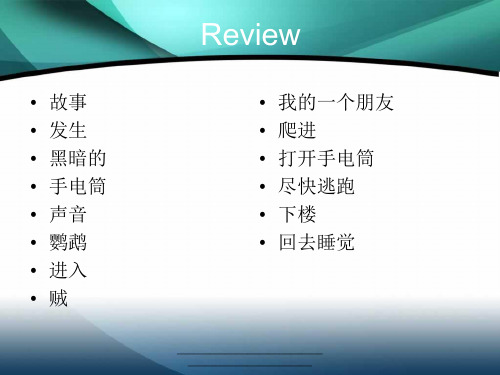
• 失去父母的孩子叫做孤儿。 • 我想要一个有大窗户的房间。 • I’d like a room whose window is big. • 用铅笔写的信很难读 • A letter that is written in pencil is difficult to read.
• recognize v. • 1) 认出 • 你能认出他的笔迹吗? • Do you recognize his handwriting? • 2)承认(事实),认清,确认 • 我们都肯定她在舞蹈方面有才华。 • We all recognized her talent for dancing. • 他不承认自己犯下了大错。 • He didn’t recognize that he had made a big
___________________________ _______________________
• 2) 忘记事 • --I forgot my umbrella. 我忘了带伞。 • 他将伞忘在火车上。 • He forgot his umbrella on the train, • = He left his umbrella on the train.
n. 经理 v. 照应,服务,接待 n. 柜台
v. 认出
___________________________ _______________________
• customer n. 顾客(买东西的顾客) • client 银行,律师等的客户 • guest 旅馆的旅客 • passenger 乘客 • a regular customer 老顾客 • 顾客至上。 • The customer is always right.
mistake.
• recognize v. • 1) 认出 • 你能认出他的笔迹吗? • Do you recognize his handwriting? • 2)承认(事实),认清,确认 • 我们都肯定她在舞蹈方面有才华。 • We all recognized her talent for dancing. • 他不承认自己犯下了大错。 • He didn’t recognize that he had made a big
___________________________ _______________________
• 2) 忘记事 • --I forgot my umbrella. 我忘了带伞。 • 他将伞忘在火车上。 • He forgot his umbrella on the train, • = He left his umbrella on the train.
n. 经理 v. 照应,服务,接待 n. 柜台
v. 认出
___________________________ _______________________
• customer n. 顾客(买东西的顾客) • client 银行,律师等的客户 • guest 旅馆的旅客 • passenger 乘客 • a regular customer 老顾客 • 顾客至上。 • The customer is always right.
mistake.
新概念英语NCE1_lesson121-122-2课件
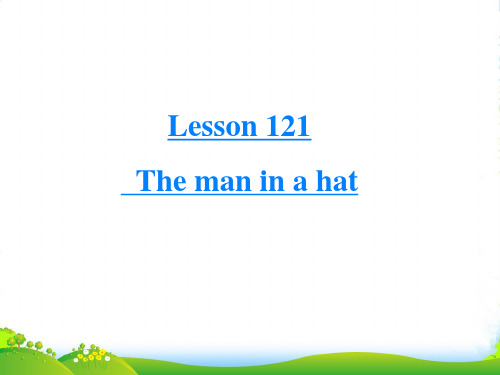
CUSTOMER: I bought two expensive dictionaries here half and hour ago, but I forgot to take them with me.
MANAGER: Who served you, sir? CUSTOMER: The lady who is standing behind the counter. MANAGER: Which books did you buy? CUSTOMER: The books which are on the counter. MANAGER: Did you serve this gentleman half an hour ago, Caroline?
Serve it to the ladies first. 把它先端给女士们。 (3)为……服务/服役;任职: The old cook has served the family for 30 years. 这位老厨师已为这家干了30年了。 He began to serve in the Navy in 1960. 他从1960年起开始在海军服役。
Lesson 121 The man in a hat
New words and expressions
1. Customer ['kʌstəmə] n. 顾客 custom 风俗 customs 海关 有顾客customer的地方,肯定就有shop assistant
/waiter/waitress Customer is god.
He says he's the man who bought these books. CAROLINE: I can't remember. The man who I served was wearing a
新概念英语NCE1_lesson121-122(共51页)课件

The man we met is my uncle.
④(先行词)物 + which/that + 动词(作主语)
which是指人以外的生命或没有生命的东西
This is the bird which always sings at night.
⑤(先行词)物+which/that + 主语 + 及物动词(作宾语)
③ 如果关系代词在从句中作介词的宾语,且介词提前了, 介词后的关系代词只能加whom(人)/which(物),不能用that。 That’s the man I told you about.
Question
Why didn't Caroline recognize the customer straight away?
recognize
① v. 认出;认识
Can you recognize the person?
② v. 承认;确认
I recognize that he is more capable than I am.
serve
① v. 服务;接待;侍候
Are you being served, sir?
He is offered a job in Canada.
② v. 提出;出(价)
Do you have any good suggestions to offer?
③ v.(主动)表示愿意,提议
He offered to help me.
grow (grew/grown)
① v. 生长;成长
Lesson 121 The man in a hat forget v. 忘记
forget to do sth. I have forgotten to bring my book. forget doing sth. I will never forget finding that book in my garden.
④(先行词)物 + which/that + 动词(作主语)
which是指人以外的生命或没有生命的东西
This is the bird which always sings at night.
⑤(先行词)物+which/that + 主语 + 及物动词(作宾语)
③ 如果关系代词在从句中作介词的宾语,且介词提前了, 介词后的关系代词只能加whom(人)/which(物),不能用that。 That’s the man I told you about.
Question
Why didn't Caroline recognize the customer straight away?
recognize
① v. 认出;认识
Can you recognize the person?
② v. 承认;确认
I recognize that he is more capable than I am.
serve
① v. 服务;接待;侍候
Are you being served, sir?
He is offered a job in Canada.
② v. 提出;出(价)
Do you have any good suggestions to offer?
③ v.(主动)表示愿意,提议
He offered to help me.
grow (grew/grown)
① v. 生长;成长
Lesson 121 The man in a hat forget v. 忘记
forget to do sth. I have forgotten to bring my book. forget doing sth. I will never forget finding that book in my garden.
新概念英语第一册课件Lesson121-122 (共45张PPT)

❖ take sb sth = take sth to sb 把某物拿去给某人
I’ll take some presents to my friends in Beijing.
= I’ll take my friends in Beijing some presents.
2.Who served you, sir?
The lady who is standing behind the counter.
❖ served是serve的过去式,“服务” 我会全心全意为人民服务的。
I’ll serve the people with heart and soul. ❖ 定语从句
3.Which books did you buy? The books which are on the counter.
❖ counter ❖ recognize
n. 顾客 v. 忘记 n. 经理 v. 照应,服务,
接待 n. 柜台 v. 认出
Key words&expressions
❖ customer ❖ forget ❖ manager ❖ serve
❖ counter ❖ recognize
n. 顾客 v. 忘记 n. 经理 v. 照应,服务,
T: How did she recognize him as the man whom she had served?
T: Where were the books? S: They were on the counter.
T: Did Caroline remember the person who had bought the dictionaries?
❖ Would you…? 请你…好吗? ❖ All right=OK.表示“好吧,行”
新概念第一册121课(ppt课件)
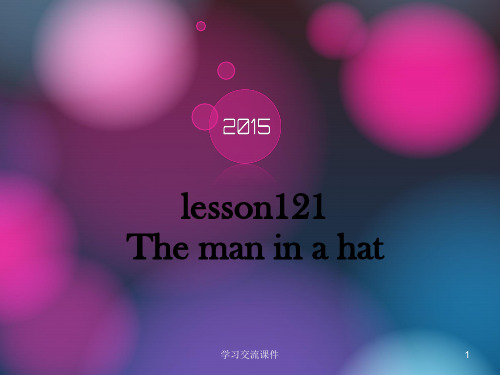
lesson121 The man in a hat
学习交流课件
1
customer 顾客 passenger 乘客 guest 旅游的旅客 custom 海关,习俗,风俗 forget 忘记 remember 记得
学习交流课件
2
manage 管理
serve 照应,服务 service 服务
servant 佣人,奴隶 survive 幸存
学习交流课件
4
The lady who is standing behind the counter.
who 谁,引导了一个定语从句,用来 解释说明the lady。
is standing 现在进行时
The books which are on the counter.
which 哪一个,引导了一个定语从句, 用来解释说明 the books
counter 柜台 count 数数
学习交流课件
3பைடு நூலகம்
I bought two expensive dictionaries here half an hour ago,but i forgot to take them with me.
ago 一般过去式标志词 forget to do sth 忘记要去做某事(未做) forget doing sth 忘记做过的事 (已做) take sth with sb 随身带上某物
lesson121themaninahat1?customer顾客?passenger乘客guest旅游的旅客?custom海关习俗风俗?forget忘记remember记得2?manage管理?serve照应服务service服务?servant佣人奴隶?survive幸存?counter柜台count数数3iboughttwoexpensivedictionariesherehalfanhouragobutiforgottotakethemwithme
学习交流课件
1
customer 顾客 passenger 乘客 guest 旅游的旅客 custom 海关,习俗,风俗 forget 忘记 remember 记得
学习交流课件
2
manage 管理
serve 照应,服务 service 服务
servant 佣人,奴隶 survive 幸存
学习交流课件
4
The lady who is standing behind the counter.
who 谁,引导了一个定语从句,用来 解释说明the lady。
is standing 现在进行时
The books which are on the counter.
which 哪一个,引导了一个定语从句, 用来解释说明 the books
counter 柜台 count 数数
学习交流课件
3பைடு நூலகம்
I bought two expensive dictionaries here half an hour ago,but i forgot to take them with me.
ago 一般过去式标志词 forget to do sth 忘记要去做某事(未做) forget doing sth 忘记做过的事 (已做) take sth with sb 随身带上某物
lesson121themaninahat1?customer顾客?passenger乘客guest旅游的旅客?custom海关习俗风俗?forget忘记remember记得2?manage管理?serve照应服务service服务?servant佣人奴隶?survive幸存?counter柜台count数数3iboughttwoexpensivedictionariesherehalfanhouragobutiforgottotakethemwithme
新概念一册第121课 课件

② v.(词语)表示……意思 What does…mean?
What does “the green light” mean? The green light means ‘Go on’.
③ v. 意指;意欲 He didn’t mean to hurt you.
must, have to和needn’t
He is offered a job in Canada.
② v. 提出;出(价)
Do you have any good suggestions to offer?
③ v.(主动)表示愿意,提议
He offered to help me.
grow (grew/grown)
① v. 生长;成长
含有at的词组往往都有不礼貌的成分
shout at 朝某人喊 point at 指着某人 laugh at 嘲笑
dream ①en dream at night?
② v. 梦想;幻想
She dreamed that one day she would be a Singer. She once dreamed of becoming a famous Singer.
表示对现在的猜测和推断: He can’t be shaving. He must be having a bath. 。 表示对过去的猜测和推断,用must have been表示肯定的推断, 用can’t have been来表示否定的推断, She can’t have been 29. She must have been 36.
wave n. 波浪 ① v. 招手;挥手示意
He waved us quiet. wave sb. goodbye wave to sb. wave at sb.
新概念一册第121ppt课件
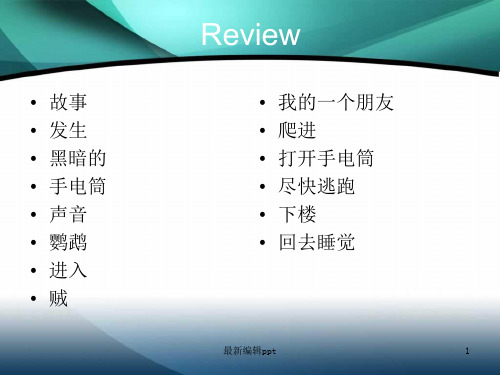
最新编辑ppt
14
• CUSTOMER: I bought two expensive dictionaries here half an hour ago, but I forgot to take them with me.
• MANAGER: Who served you, sir? • CUSTOMER: The lady who is standing behind the counter. • MANAGER: Which books did you buy? • CUSTOMER: The books which are on the counter.
17
课文讲解
• I bought two expensive dictionaries here half an hour ago, but I forgot to take them with me.
• half an hour ago 半小时之前(用在过去时当中) • hour 是以元音音素开头字母,前面的不定冠词用
• The customer is always right.
最新编辑ppt
5
• --forget v. • 1) 忘记 • 我忘了他的电话号码。
• I forget his telephone number. • forget doing 忘记曾做过 • 我永远忘不了在纽约见到他。
• I’ll never forget seeing him in New York. • forget to do 忘记去做 • 别忘了打电话给我。
• service n. • 那家餐馆的服务很差。 • The service in that restaurant is poor. • a charge for service 服务费
新概念第一册121课件

a charge for service 服务费
ccoouunntteerr
n.
1) 柜台 at the jewelry counter 在珠宝柜台 checkout counter 付账柜台 2)柜台式长桌 lunch counter 柜台式长餐桌 3)计算器
recognize
v.
1)认出
e.g. Do you recognize my handwriting? 你能认出我的笔迹吗?
2)承认(事实),认清,确认
e.g. We all recognized her talent for dancing. 我们都承认他在舞蹈方面有才华。
e.g. He didn't recognize that he had made a big mistake. 他不承认自己犯下了大错。
定语:用来修饰、限定、说明名词 (或代词)的特征的。
e.g. Don't forget to go to the forest cabin and let it all hang out on holidays.
别忘了在假日去森林小木屋完全放松一下。
forget v.
2)忘记带 (买、做)
e.g. I forgot my umbrella. 我忘了带伞。
?Mrs. Read is the person to whom you should write.
?The people with whom I am staying are very kind.
Grammar
定语从句(The Attributive Clause)
?限制性定语从句 (由关系代词引导的) 2. whose
即可指人也可指物,在从句中做定语。 ?Miss Li is the teacher whose house caught fire last year
新概念英语第一册课件Lesson121-122
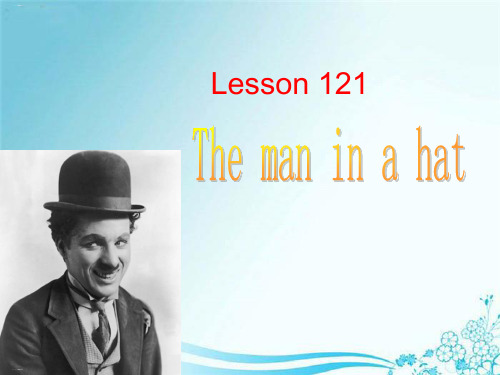
6.recognize ['rekəɡnaiz] v. ❖ (1)认出;熟悉:
I recognize him now. 我现在认出他来了。 ❖ recognize an old acquaintance 认出一位老相识 ❖ refuse to recognize sb. any longer 不再理睬某人 ❖ recognize one's duty 认清自己的职责
接待 n. 柜台 v. 认出
Key words&expressions
1. customer ['kʌstəmə] n. 顾客
❖ custom 风俗 ❖ customs 海关 ❖ 有顾客customer的地方,肯定就有 shop
assistant /waiter/waitress ❖ guest 旅馆的旅客 ❖ passenger 乘客
❖ counter ❖ recognize
n. 顾客 v. 忘记 n. 经理 v. 照应,服务,
接待 n. 柜台 v. 认出
Key words&expressions
❖ customer ❖ forget ❖ manager ❖ serve
❖ counter ❖ recognize
n. 顾客 v. 忘记 n. 经理 v. 照应,服务,
❖ ② v. 供应;摆出(食物或饮料等) ❖ What time is breakfast served in this hotel?
❖ ③ v. 为……服务/服役;任职 ❖ The old cook has served the family for 30 years.
❖ serve the people heart and soul
❖ (2)承认;确认: ❖ recognize this new government 承认这个新政府
I recognize him now. 我现在认出他来了。 ❖ recognize an old acquaintance 认出一位老相识 ❖ refuse to recognize sb. any longer 不再理睬某人 ❖ recognize one's duty 认清自己的职责
接待 n. 柜台 v. 认出
Key words&expressions
1. customer ['kʌstəmə] n. 顾客
❖ custom 风俗 ❖ customs 海关 ❖ 有顾客customer的地方,肯定就有 shop
assistant /waiter/waitress ❖ guest 旅馆的旅客 ❖ passenger 乘客
❖ counter ❖ recognize
n. 顾客 v. 忘记 n. 经理 v. 照应,服务,
接待 n. 柜台 v. 认出
Key words&expressions
❖ customer ❖ forget ❖ manager ❖ serve
❖ counter ❖ recognize
n. 顾客 v. 忘记 n. 经理 v. 照应,服务,
❖ ② v. 供应;摆出(食物或饮料等) ❖ What time is breakfast served in this hotel?
❖ ③ v. 为……服务/服役;任职 ❖ The old cook has served the family for 30 years.
❖ serve the people heart and soul
❖ (2)承认;确认: ❖ recognize this new government 承认这个新政府
- 1、下载文档前请自行甄别文档内容的完整性,平台不提供额外的编辑、内容补充、找答案等附加服务。
- 2、"仅部分预览"的文档,不可在线预览部分如存在完整性等问题,可反馈申请退款(可完整预览的文档不适用该条件!)。
- 3、如文档侵犯您的权益,请联系客服反馈,我们会尽快为您处理(人工客服工作时间:9:00-18:30)。
• • • • • • • • •
I can’t remember. The man who I served was wearing a hat. wear 穿(表示状态) put on 穿上(强调动作) Have you got a hat, sir? Yes, I have. Would you put it on, please? All right. Would you…? 请你…好吗?
• • • • •
2) 忘记事 --I forgot my umbrella. 我忘了带伞。 他将伞忘在火车上。 He forgot his umbrella on the train, = He left his umbrella on the train.
• • • • • • • • • •
Lesson 121
The man in a hat
单词学习
• • • • • • customer forget manager serve counter recognize n. 顾客 v. 忘记 n. 经理 v. 照应,服务,接待 n. 柜台 v. 认出
• • • • • • •
customer n. 顾客(买东西的顾客) client 银行,律师等的客户 guest 旅馆的旅客 passenger 乘客 a regular customer 老顾客 顾客至上。 The customer is always right.
• • • •
Which books did you buy? which 指在一定范围内的哪个(些) which 既可用来指人,又可用来指物 Did you serve this gentleman half an hour ago, Caroline? • He says he’s the man who bought these books.
• • • • • • • • • • • •
--forget v. 1) 忘记 我忘了他的电话号码。 I forget his telephone number. forget doing 忘记曾做过 我永远忘不了在纽约见到他。 I’ll never forget seeing him in New York. forget to do 忘记去做 别忘了打电话给我。 Don’t forget to call me. 她忘了寄信 She forgot to mail the letter.
• • • • • • • • • •
MANAGER: Did you serve this gentleman half an hour ago, Caroline? He says he's the man who bought these books. CUSTOMER: I can't remember. The man who I served was wearing a hat. MANAGER: Have you got a hat, sir? CUSTOMER: Yes, I have. MANAGER: Would you put it on, please? CUSTOMER: All right. MANAGER: Is this the man that you served, Caroline? CUSTOMER: Yes. I recognize him now.
定语从句
• 定义:在复合句中修饰名词和代词的从句 叫做定语从句。 • 被定语从句修饰的名词或代词是先行词。 定语从句必须放在先行词之后。 • The student who answered the question was peter. • 回答问题的那个学生叫Peter.
• 用作关联词的关系代词有who, whom, whose, that, which 等。 • A child whose parents are dead is called an orphan. • 失去父母的孩子叫做孤儿。 • 我想要一个有大窗户的房间。 • I’d like a room whose window is big. • 用铅笔写的信很难读 • A letter that is written in pencil is difficult to read.
课文讲解
• I bought two expensive dictionaries here half an hour ago, but I forgot to take them with me. • half an hour ago 半小时之前(用在过去时当中) • hour 是以元音音素开头字母,前面的不定冠词用 “an” • forget to do 表示忘记去做某事 • 昨天我忘记了要给你打电话。 • I forgot to call you yesterday. • 下次别忘了把你的书带来。 • Don’t forget to bring your book here next time.
• Is this the man that you served. Caroline? • Yes, I recognize him now.
• Listen and answer
• Why didn't Caroline recognize the customer straight away?
• CUSTOMER: I bought two expensive dictionaries here half an hour ago, but I forgot to take them with me. • MANAGER: Who served you, sir? • CUSTOMER: The lady who is standing behind the counter. • MANAGER: Which books did you buy? • CUSTOMER: The books which are on the counter.
• • • • • • • • • • • • •
顾:半小时以前我在这里买了两本很贵的辞典,但是我忘了拿走。 经:是谁接待您的,先生? 顾:站在柜台后面的那位女士。 经:您买的是两本什么书? 顾:就是柜台上的那两本。 经:卡罗琳,半小时前你接待过这位先生吗? 他说他就是买这两本书的人。 卡:我记不起来了。我接待的那个人戴着 一顶帽子。 经:先生,您有帽子吗? 顾:有的,我有帽子。 经:请您把帽子戴上好吗? 顾:好吧。 经:卡罗琳, 这就是你接待过的那个人吗? 卡:是他。我现在认出他来了。
• Who served you, sir? • The lady who is standing behind the counter. • served是serve的过去式,“服务” • 我会全心全意为人民服务的。 • I’ll serve the people with heart and soul. • 这不喜欢站在门口的那个男人。 • I don’t like that man who is standing by the gate.
• bring sth with sb 把某物带来 • 如果你下次再不把书带来,我就给你父亲 打电话。 • Peter, if you don’t bring your book with you next time, I’ll call your father. Peter, • bring sb sth = bring sth to sb • 把某物带给某人 • 谢谢你给我带来你的照片。 • Thank you for bring me your pictures.
Review
• • • • • • • • 故事 发生 黑暗的 手电筒 声音 鹦鹉 进入 贼 • • • • • • 我的一个朋友 爬进 打开手电筒 尽快逃跑 下楼 回去睡觉
• 这是一年前发生在我的一个朋友身上的故事。 • 当我的朋友乔治在床上看书时,两个小偷爬进了 他的厨房。 • 他们进到屋里后,走进了饭厅。饭厅很暗,于是 他们打开了手电筒。 • 突然他们听到身后有声音。小偷扔下了手电筒, 飞快地逃走了。 • 乔治听到了响声,迅速地下了楼。 • 他开了灯,但不见一个人。小偷逃走了。 • 但时乔治的鹦鹉亨利仍在那里。
manager n. 经理 销售经理 sales manager 总经理 General Manager 他是我们的经理 He is our manager. manage v. 管理 经营公司 manage a company
• • • • • • • • • • •
serve v. 照应,服务,接待 一位年轻的侍者侍候他们进餐 A young waitor served them. serve sb right (口语) 给某人应得的报应(惩罚) 他活该 Serve him right.= It serves him right! service n. 那家餐馆的服务很差。 The service in that restaurant is poor. a charge for service 服务费
• take sth with sb 把某物带走 • 我去那个村庄的时候我随身带了一些药。 • I took some medicine with me when I went to the village. • take sb sth = take sth to sb • 把某物拿去给某人 • 我将给我在北京的朋友们带一些礼物。 • I’ll take some presents to my friends in Beijing. • = I’ll take my friends in Beijing some presents.
• • • y counter 付帐柜台 checkout counter
• • • • • • • • •
recognize v. 1) 认出 你能认出他的笔迹吗? Do you recognize his handwriting? 2)承认(事实),认清,确认 我们都肯定她在舞蹈方面有才华。 We all recognized her talent for dancing. 他不承认自己犯下了大错。 He didn’t recognize that he had made a big mistake.
